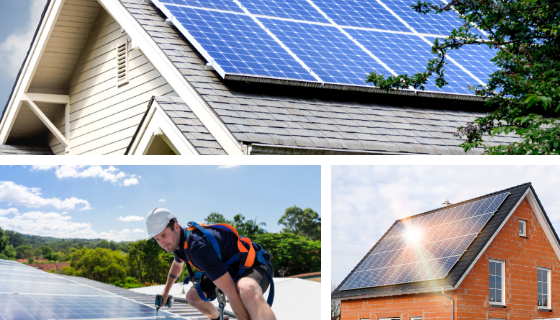First Steps When Considering Rooftop or Ground-mounted Solar

Location, Location, Location. Similar to a new home purchase, finding a suitable location is the first and most important thing to research when considering the addition of solar panels to your home. Your goal is to obtain maximum sun exposure without sacrificing your home’s curb appeal.
Rooftop solar installation is a popular choice due to its environmentally-friendly technology and cost effectiveness. However, if you have trees, chimneys or poles creating excessive shade on your roof, rooftop panels may not produce enough energy to power your home. The size, shape and slope of your roof are also important factors to consider. According to the U.S. Office of Energy Efficiency and Renewable Energy, solar panels perform best on south-facing roofs with a slope between 15 and 40 degrees, though other roofs may be suitable. The age and strength of your roof is also important. To avoid the additional costs of uninstalling and reinstalling your solar panels, first ensure that your current roof will outlive the lifespan of your new solar system. The industry estimates that solar panels effectively produce energy for 25–30 years. After this time, energy production often declines significantly according to manufacturer standards.
If your roof doesn’t provide ideal conditions, ground-mounted or pole-mounted solar panels are another popular option. These are generally more expensive than roof-top panels due to additional equipment, labor and permitting that may be required for installations. As with rooftop systems, your goal is maximum sun exposure in a location near your home that you can easily set apart to protect the panels.
Both rooftop and ground-mounted solar require professional installation. We encourage any member looking to purchase and install residential solar to call our Energy Solutions team before you begin the process. Improperly installed solar equipment can cause backfeeding onto the electrical grid and be fatal to a lineman. It is vitally important that any member with a home solar system notify the cooperative before its installation to receive proper information that can protect our crews. As your trusted energy advisor, we can also answer any questions, point you to reliable solar installers in our area and provide you with a list of questions to ask your solar installer.
Blue Ridge Energy wants to help make solar energy accessible to all members. If you don’t have a prime location for solar panels at your home, click here to learn more about our Community Solar program. For a low monthly fee, you can subscribe to the energy produced by one or more solar panels in a local cooperative-owned solar garden.



